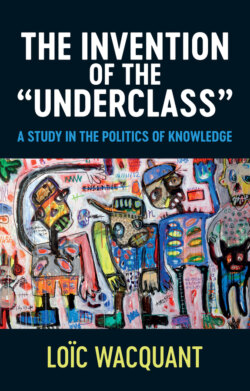Читать книгу The Invention of the 'Underclass' - Loic Wacquant - Страница 12
Anti-urbanism and the fear of the (black) city underbelly
ОглавлениеTo elucidate the full meaning and mechanisms of the invention of the “underclass” in the late twentieth century, it is essential to historicize them, in this case to set them against two staggered backdrops that reveal analogues and precursors of the category. The first and deeper backdrop is a centuries-long strand of abiding anti-urbanism in American culture and politics, with roots in the country’s origin as an agrarian settler colony and the steadfast desire to distinguish itself from Europe and its great cities – which Thomas Jefferson famously viewed as “pestilential to the morals, the health and the liberties of man.” For this national tradition, the metropolis is an engine of class conflict, ethnic promiscuity, social disintegration, and moral perdition, as exemplified by the shrill denunciations of the “wicked city” that flourished in the mid-nineteenth century.23
The second backdrop is a more recent historical vision that recentered urban fear and fulmination onto the dark “inner city” during the postwar decades, making race as blackness the paramount prism of public perception and policy in the metropolis. This inflection of anti-urbanism, provoked by the ghetto uprising of the 1960s, portrayed poor blacks as agents of violence, disorder, and immorality, and the city itself as an ungovernable sociospatial form doomed to crisis, breakdown, and irreversible decline.24 Both backstories suggest that the impulse to sociomoral control in the metropolis has a long and recurrent history; and that this impulse drives the symbolic delineation of the target populations viewed as desecrating the values of the Anglo middle and upper classes – and not the other way around.
In the collective imaginary of the United States, and especially among its educated elite, the emergence of the first urban centers in the 1830s was experienced as a mortal threat to the young nation and its exceptional character, as it undermined the mythic pioneer virtues of independence and self-sufficiency. The city was considered the dissolute redoubt of the “three Ms,” mongrels, mobs, and money, a dumping ground for the dregs of European society, a foul and sinful place that made a dignified life impossible.25 The flourishing of urban-reform societies rooted in Evangelical Christianity at mid-century, with their missionary visitors, tract associations distributing bibles, and Sunday schools aiming to revive the moral order of the village, was no match for the surging urban masses at once “vicious, abandoned, debased.” Tidal waves of migration and working-class formation soon triggered trepidation over the “replication of European conditions” and alarm at the spread of “popery” and “pauperism.”26
